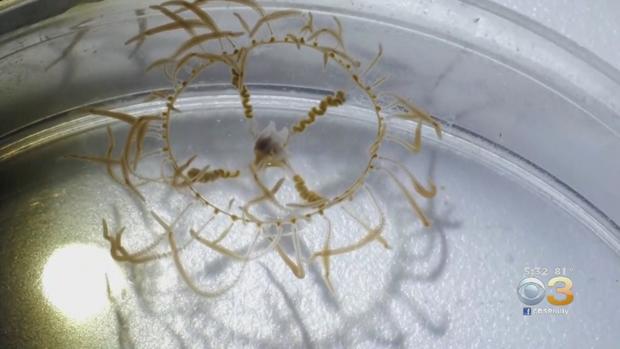Dangerous, Dime-Sized Clinging Jellyfish Found In North Wildwood, Officials Warn
NORTH WILDWOOD, N.J. (CBS) -- A jellyfish know for painful stings has turned up in a saltwater pond in North Wildwood, creating a lot of concern. It's the first time this specific type of jellyfish, known as clinging jellyfish, has been found this far south in New Jersey.
It's a little ocean creature that fascinates some and gives others the heebee-jeebies. But make no mistake about it, the tiny clinging jellyfish packs a pop when it stings.
"Well, I don't like the part that you're going to get stung by these jellyfish and that they cling to you, because they were saying that their sting is really pretty bad," North Wildwood resident Debbie DiPierro said.
New Jersey Seeks Applicants For New Medical Marijuana Businesses
This week, the New Jersey Department of Environmental Protection issued a warning that clinging jellyfish were found in a large tidal pool next to Hereford Inlet Park in North Wildwood.
They come from the Pacific Ocean, but showed up in New Jersey about three years ago. The ones found in North Wildwood are the first to be discovered south of Ocean County.
"I really didn't hear about it until you told us so they should probably make it more public knowledge," Philadelphia resident Lauren Angell said.
On Wednesday afternoon, state officials posted warning signs near the pond, which is technically off limits as part of a protected wildlife area. But since families play in the adjacent waters to the pond, the city of North Wildwood also issued a public notice online.
"These are not indigenous jellyfish to this area and they cause a very painful sting, and so the notice was put out to warn people about these jellyfish being found here," North Wildwood mayor Patrick Rosenello said.
Rising Sea Levels Will Leave Atlantic City Uninhabitable By End Of The Century, Researchers Say
Officials say the sting is painful, but so far no cases have been lethal. People should avoid the pond and if they see the dime- to quarter-sized jellyfish anywhere else, report it to local authorities and get medical attention if you or your family suffer a severe reaction.
"I don't want [my kids] anywhere near that," Angell said.
The jellyfish like still water, like ponds or bays and attach themselves to plants.




